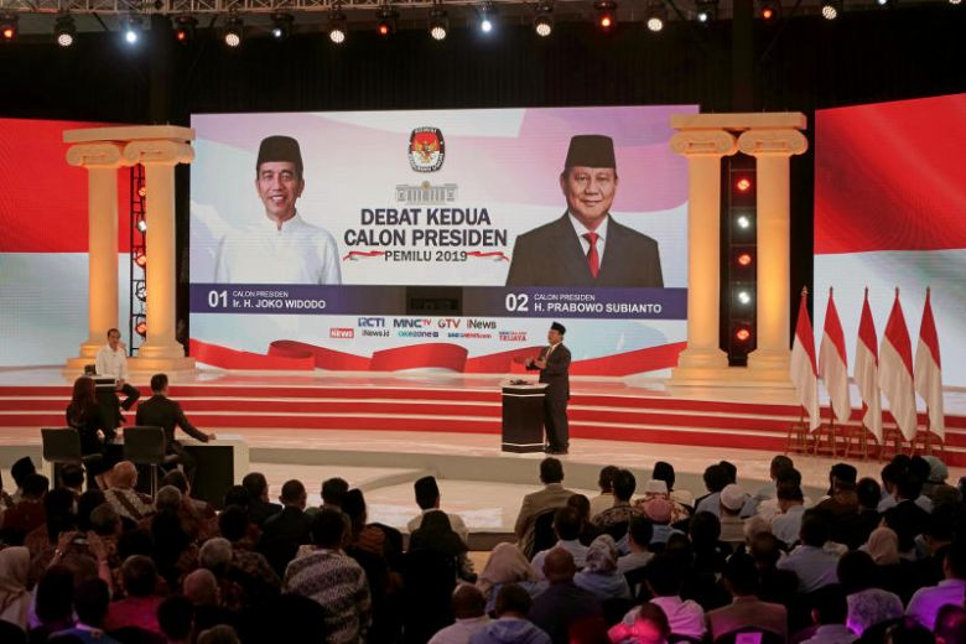JAKARTA, Indonesia (ViaNews) – On February 17, Indonesia’s second presidential debate was held at Sultan Hotel. In this occasion, only presidential hopefuls, Joko Widodo (Jokowi) and Prabowo Subianto, came to the stage without their vice presidential candidates, Ma’ruf Amin and Sandiaga Uno.
A few minutes before the debate, an explosion occurred near the debate location. Around seven were injured, and no casualties were reported, the police said. The blast was caused by firecrackers.
The second debate was about infrastructure, energy, food, environment, and natural resources. Unlike the first show, the General Election Commission (KPU) did not give questions to both candidates in advance.
It is interesting to fact check what each candidate claimed in the debate. More than 24 media outlets reviewed fact from statements from each presidential hopeful. Here they are.
Jokowi: “In the environment sector, we want land and peatland fires not to happen again. We have overcome it, and there have been no land and peatland fires in the last three years, and it is because of our hard work.”
Fact: According to the Ministry of Environment and Forestry, from January to July 2017, around 20,000 hectares of land were affected by a fire.
According to data from the Forestry Office, in 2018 fire damaged approximately 37,362 hectares of land throughout Karhutla (land and forest fire). The most recent data from the National Disaster Mitigation Agency (BNPB) showed that 843 hectares of land in Riau province have been damaged by fire from January to February 2019.
Jokowi: “No conflict with local residents during the land release process for infrastructure works.”
Fact: Greenpeace data showed a conflict with local residents in the construction of steam power plant in Batang, Central Java in 2015. Until 2016, 71 people refused to be relocated and they were eventually forcefully evicted.
Researcher Iqbal Damanik described that 208 agrarian conflicts occurred throughout 2017, accounting for 32 percent of the number of total disputes. The property-related clash came second with the total number of 199, followed by conflict on infrastructure development (94 disputes, 14 percent).
Prabowo: “An automaker in Germany that employs 15,000 workers now they can be replaced with robots, and the company only needs around 50 workers.”
The former general warned about the impact of the fourth Industrial Revolution when robots replace human. The Ifo Economic Institute revealed in a study conducted by the country’s VDA car industry lobby that a full ban on conventional cars in Germany will put 600,000 workers at risk by 2030.
A switch to sales of eco-friendly cars will harm 426,000 jobs in the auto manufacturing sector, the study said.
Prabowo: “Only less than 1 percent of the population controls half our wealth.”
Fact: According to Indonesia’s Inequality Report released by Oxfam in February 2017, Indonesia’s wealthiest people have more wealth than the most impoverished 100 million.
Oxfam report said: “Since 2000, economic growth has taken off in Indonesia. However, the benefits of growth have not been shared equally, and millions have been left behind especially women.”
The Global Wealth Report 2018 data released by Credit Suisse showed that 1 percent of Indonesia’s population controlled around 47 percent of the country’s adult population’s wealth. Only 0,9 percent of Indonesians have wealth worth more than $ 10,000.
Prabowo: “We will lower the cost of electricity.”
Fact: The Jokowi-Jusuf Kalla administration slashed the premium electricity subscription price for the Java-Bali region from Rp 6.550 to Rp 6.450
Jokowi: “The government has disbursed Rp 187 trillion in villages’ fund.”
Fact: According to data from the Ministry of Finance, the government in the State Budget (APBN) allocated Rp 20. 67 trillion in villages’ fund in 2015, Rp 46.98 trillion (2016), Rp 60 trillion (2017) and Rp 60 trillion (2018). The total amount of villages ‘ fund during the Jokowi government has reached Rp 187. 65 trillion. In 2019, the government has allocated Rp 70 trillion for villages across the archipelago.
Prabowo: “Indonesia will import 100% of its oil.”
Fact: It can be true, but not too soon. Indonesia’s oil lifting will likely continue to slump, but it is unlikely if the country will rely on imported oil.
In 2019, the government only sets an oil production target at 75,000 barrel per day. The state oil firm Pertamina snubbed Prabowo’s statement, saying that the company is building a refinery in Balikpapan, East Kalimantan aimed at boosting oil output.
Jokowi: “In 2014, Indonesia imported 3.5 million tons of corns. In 2018, Indonesia only imported 180,000 tons.”
Fact: The incumbent did not quote accurate data. Data from Statistics Indonesia (BPS) showed that corn import throughout 2018 reached 737,000 tons. However, no detailed explanation of whether those corns are for industrial ingredients, animal feed, or consumption.
Minister of Trade Enggartiasta Lukita said that Jokowi used accurate data, as 180,000 tons referred to corns for food consumption (based on data from the Ministry of Agriculture). But, a researcher at the Bogor Agricultural Institute (IPB) Dwi Andreas Santoso claimed the president did not rely on the correct figure.
Conclusion
Prabowo as the opposition tended not to attack Jokowi as the incumbent. Some said that Prabowo could have explored more about food import, but he did not elaborate that in the opening session when each candidate delivered policy related to those five sectors (infrastructure, food, environment, energy, and natural resources).
Some green activists focused on how each candidate explained environmental issues. Jokowi lacked accurate data (on a forest fire, the number of companies blacklisted for damaging the environment and so on) while Prabowo did not explain more detail his strategies to solve environmental problems, as Executive Director of Indonesian Center for Environmental Law (ICEL) Henri Subagiyo said.
While discussing the infrastructure sector, Jokowi stressed more on road development projects, but he failed to relate that to environmental issues. While Prabowo slammed the incumbent’s infrastructure plans for not conducting feasibility studies and described green issues, but he did not provide supporting data and information to back his claims.







